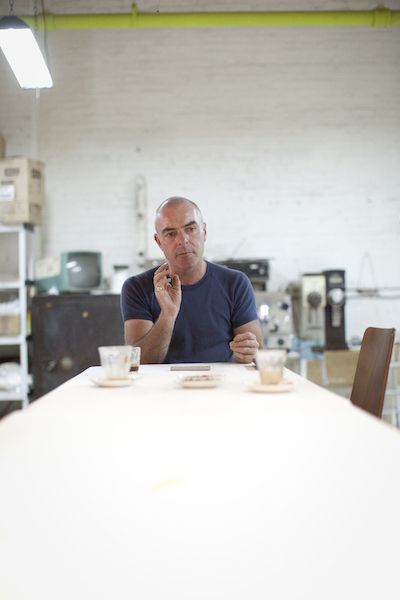Cruise too quickly past the corrugated metal roll-downs and auto shops of Bed-Stuy, and you just might miss the sound of milk being frothed to perfection, or the gentle Aussie accent guiding his class of budding baristas. Rowan Tuckfield’s mysterious Kitten Coffee, a one- (and sometimes two-) man operation headquartered near Hasidic Williamsburg may come as something of a surprise. But in this borough, an artisanal roaster should hardly sneak up on you on little cat feet.
The oft-grinning 48-year-old Tuckfield conceived of Kitten three years ago as both a roastery and a barista-training hub, just as New York was entering a national coffee movement he felt the city would one day come to dominate. He thought he might bring a different perspective and background to the industry than the pervasive fixed-gear-and-tattoo-set. Believing that execution is as important as equipment, he established Gotham’s first barista school, where any eatery using Kitten Coffee beans can send its staff for unlimited free instruction.
“The best city in the world should have the best coffee in the world. And we firmly believe that training is everything,” says Tuckfield as he prepares a macchiato in the Kitten Coffee barista school—a ’50s-styled linoleum corner dotted with vintage espresso equipment. The retrofitted garage space is lined with coffee sacks and classroom tables. “It’s not a lab,” laughs the down-to-earth instructor, who does the company’s green bean sourcing, roasting and everything else. He even drives the Kitten Coffee delivery-mobile—a tiny, three-wheeled 1985 Cushman Haulster truck with a kitten painted on it, it gets more attention on the street than, well, a puppy.
“It’s got a stereo,” Tuckman insists about the dubious-looking lime-green vehicle. “And a fan.”
Ex-antipodean Tuckfield once owned a small share (he gestures with a tiny pinch of the fingers) of the Kitten Club cocktail bar in Melbourne. Along with the imported name, he brought Australians’ straightforward coffee sensibility—coffee culture down under shuns drip brews, almost completely, in favor of espresso—and holds a deep deference to dairy.
“Very, very few people drink [straight] espresso,” explains Tuckfield, who steers Kitten Coffee’s offerings away from the floral spectrum and instead toward flavor profiles of big, chocolaty mouthfuls. Their espresso blend lends itself cozily to cappuccinos, lattes and macchiatos—“we’re simple men,” Tuckfield says, exchanging a humble glance with assistant Todd Broockert.
In the increasingly crowded landscape of local roasters, Kitten’s thrown its tiny collar into a ring of big cats, from longtime stalwarts like Gillies, Dallis and Irving Farm to new cats on the block like Plowshares and Stumptown. But what New York Coffee really needs, says Tuckfield, are more classroom settings to ensure that once beans leave a roastery and enter a barista’s hands, they’re treated with the utmost craft and skill.
“This city could do with 10 barista schools,” says Tuckfield, who guides the hands-on instruction for baristas using Kitten throughout the borough and beyond, like the staff at Bread Stuy, Moto, Athom Café and Char No. 4. A great barista is not just putting coffee through a machine, but tasting all day, he says—and needs to be passionately involved, like a top bartender. (Tuckfield also offers classes for the barista-curious.)
“When you go to any cocktail bar, they will always taste it before they give it to you. We teach baristas that they have to taste the coffee. You don’t have to swallow it—you can spit it out, or you will go insane!—but you have to taste it,” says Tuckfield, who spends weeks getting new Kitten customers up and running.
Staying in tune with the espresso—whose flavors can change throughout a day or a shift, based on factors like the ambient temperature and humidity changes—is vital. Though technique is something you can teach, the Kitten philosophy is to eschew barista ego or fascination with trendy coffee gear in favor of the most basic requirement: a real love of making coffee.
“We want people who have passion for hospitality,” says Tuckfield. “[Customers] love to engage with the baristas.”
It’s that one-on-one connection that makes the coffee experience feel so direct and immediate. From roasting—Tuckfield likens the necessary concentration to that needed in a black-and-white photo darkroom—to serving. Tuckfield politely dismisses some of the city’s other recent entrants as producers of more “commercial” coffee, and says that at a truly small-scale craft coffee operation, the pleasure of having your hands in the mix is what makes it.
“Have you seen the look on people’s faces the first time they’ve tasted great coffee? It’s a joy,” says Tuckfield.
But where’s the kitten?
“I live with two of them,” says Tuckfield. “They are disloyal, unloving and they shed.”
From a land down under: Like his fellow Australians, founder Rowan Tuckfield shuns drip brews in favor of espresso.
Editor’s note: Bread Stuy, Athom Café and Char No. 4 have closed.



